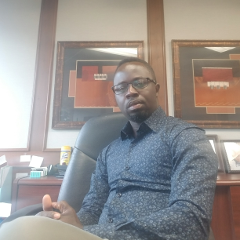Expert in natural resource management successfully defends PhD thesis
Sarah Kent - 21 July 2020

When Solomon Amoateng arrived in Edmonton to start his LLM at the University of Alberta Faculty of Law, it was his first time travelling outside Ghana, and even more dauntingly, he came by himself without his family.
Seven years later, Amoateng has successfully defended his PhD, an accomplishment that he partly credits to those who have supported him during his studies in Canada.
“It is because of them that I can call Canada a home,” says Amoateng.
He is thankful for the first welcome he received from Assistant Professor Ubaka Ogbogu, who met Amoateng at the airport in 2013 and helped him settle in, giving him advice about his new home in Edmonton.
He also has special thanks to his supervisor, Professor David R. Percy, QC. “Percy is everything to me: he is a friend, a father, an advisor, a supervisor.”
“It has been a privilege to supervise a thoughtful, diligent and pleasant person, who has overcome a number of personal obstacles to achieve his doctoral degree,” said Percy. “Solomon has an ambitious thesis.”
Amoateng’s thesis, which he successfully defended on July 6, is titled "The Juridical Nature of Participatory Governance and the Integration of Community Interests in Natural Resource Extraction and Management in Canada and Ghana."
While Ghana’s land is rich in resources, most mining communities there do not experience any financial benefit from the resource extraction in their territory, says Amoateng.
Amoateng’s thesis examines Canada’s jurisprudence on the duty to consult and accommodate Indigenous Peoples on natural resource development and argues that mining communities in Ghana could see significant benefits from implementing this meaningful participatory framework.
Duty To Consult
Current laws in Ghana do not provide a legal right for mining communities to participate in decision-making regarding the natural resource development on their land, something that Amoateng would like to see change.
The duty to consult is significant because it shifts the power dynamics between communities and decision-makers, says Amoateng.
“The main difficulty was to settle the fact that I wasn’t comparing apples to oranges,” says Amoateng, who had to justify the novel comparison between mining communities in Ghana and Indigenous Peoples in Canada.
Amoateng sees this comparison as fruitful for future research since “communities in Africa are campaigning for recognition as Indigenous Peoples.”
During his graduate studies, Amoateng received numerous recognitions for his research, including the Centre for International Governance Innovation international law graduate scholarship and the Foote Graduate Award in Law, along with generous financial support from the Rocky Mountain Mineral Law Foundation and the Canadian Energy Law Foundation.
Prior to attending UAlberta Law, Amoateng earned his LLB at Kwame Nkrumah University of Science and Technology in the Ghanaian city of Kumasi and completed the professional law program at the Ghana School of Law. Between earning his LLM and PhD at UAlberta Law, Amoateng also received a second master's degree at Dalhousie University with a focus on human rights law.
Coming full circle, Amoateng plans to return to Ghana to teach law and continue his research at a university. “I know the opportunity is there.”